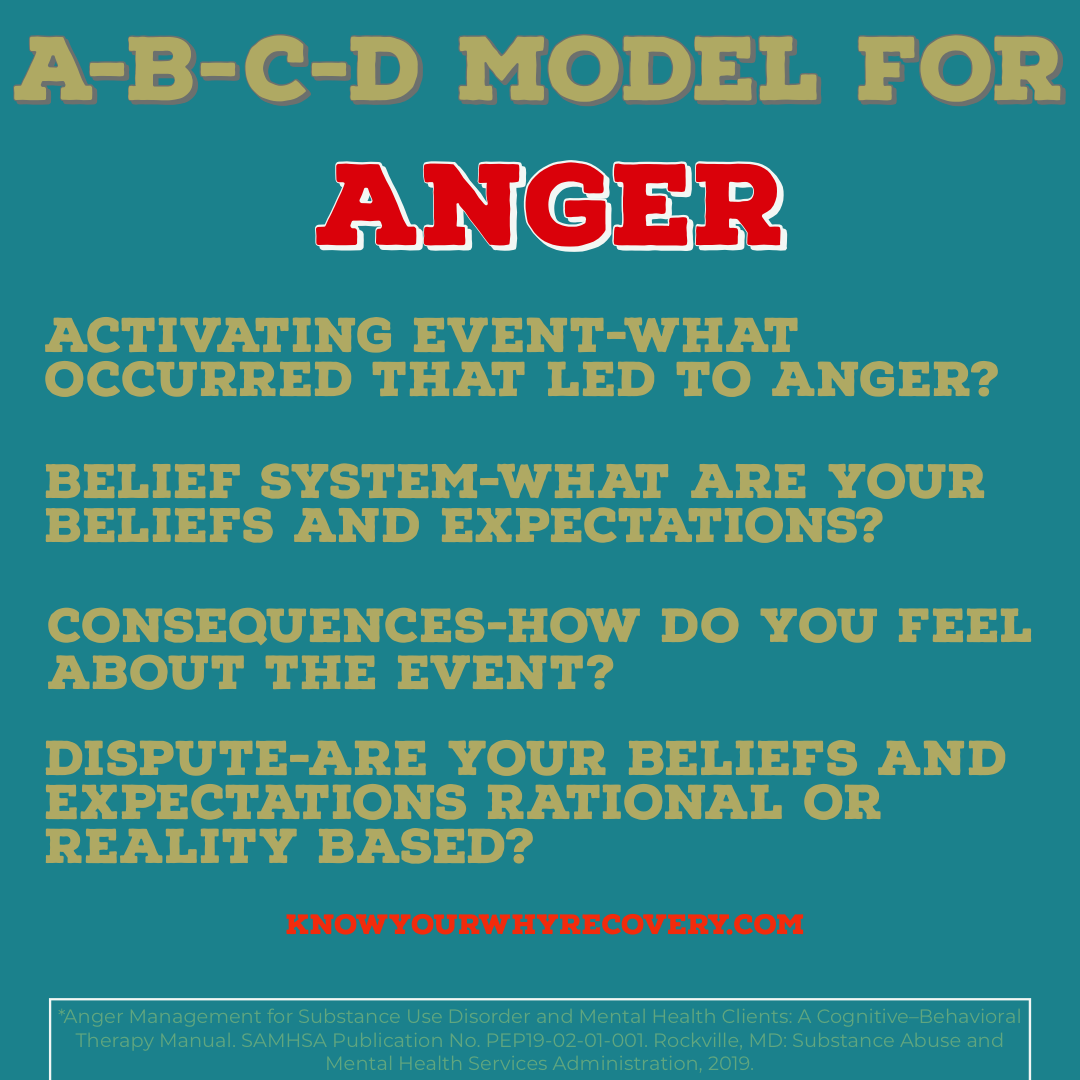
Read below for part 3 in our ongoing series on anger. This installment will focus on the A-B-C-D model which is a way of examining anger causing events in your life and reframing your thinking around these events.
The A-B-C-D model comes out of rational emotive therapy. The model is a way of guiding us to identify the source of our angry feelings and then changing or challenging our thinking to make these feelings more manageable or to alter what is being experienced. It originates in the idea that our perception of a situation or event combined with our beliefs and self-talk about the event is what leads to our feelings on the event. Ultimately, we study the events that occur and then dispute or challenge our perspectives, sometimes replacing them with more realistic or more rational beliefs. The theory is, if we change our interpretation or thoughts on the event, we may change our feelings and behaviors toward the event.
A-B-C-D Model Summary:
A-Activating Situation or Event-This is the actual situation or event that occurs
B-Belief system about the activating event-What are you telling yourself about the event? What are your beliefs and expectations of how others should carry themselves?
C-Consequences-Or rather emotional consequences about the event. How do you feel about the event based on your thinking patterns and self-talk?
D-Dispute-Examine your beliefs and expectations? Are they realistic? Are they rational? Or are they maladaptive?
Let’s look at an example below:
You are walking down the hallway and someone bumps into you, looks briefly at you in an “odd” way, and continues walking (activating event). You start to tell yourself “People should say they are sorry when they bump into others,” “That guy looked menacing and meant to bump into me,” or “He is disrespectful!” (beliefs about the event). You begin to grow frustrated and get angry. You may even feel attacked or unsafe (consequences).
What might happen in this situation? Maybe you continue to get angry and feeling attacked so you say something or do something back to this stranger. Even if you don’t respond, you may sit with your thoughts and feelings about this. Your anger and frustrations grow even though the person and event are long gone. Maybe you even start getting angry at yourself for not saying or doing anything!
Now let’s dispute. Look back at your beliefs. Stay away from the “should’ve, could’ve, would’ve” thinking here. Should people really do anything? While maybe customary and respectful to apologize it may be unfair to yourself to expect others will always act in this way. Was the person really menacing and out to get you? Is there a chance he was just as surprised as you, maybe not even paying attention which is why he bumped into you? Just because they did not say sorry, does that mean they are disrespectful? Maybe the person was just as surprised or felt attacked like you and was scared. Maybe they were in a hurry. Even if they were a disrespectful person, do they really owe you any respect and is the frustration they are causing you worth other types of consequences that may come with it? If you felt like you had to respond or challenge this person and then did not, does it make you less of a person or weak?
Replace these beliefs with other, more realistic, rational, or positive beliefs and your feelings about the situation may change. So, maybe you tell yourself “I can’t expect everyone to be respectful all of the time” or “Do I want to let this slight disrespect ruin my day and mood?” Maybe consider what we mentioned earlier, the person was in a rush or surprised themselves and just wanted to get out of there. You say to yourself “I would leave a situation like that just as well, so maybe I shouldn’t let this get to me.” Suddenly, you don’t feel so attacked by what happened. The strong feelings you had about this occurrence are a bit muted or maybe even completely changed and you are less likely to react or allow it to stick with you through your day, exciting you further.
This is a skill and like any skill, you will get better with practice. Look back at anger provoking situations and run the A-B-C-D model. Does it change anything? Does the situation seem different now? As you practice this skill you will get better at doing it even in the moment and that will help you manage your responses, lessening the chances these events, or rather, your perception of them will lead to uncontrollable anger.
-Chris Dorian, founder of Know Your Why Recovery
Based on information on information in Anger Management for Substance Use Disorder and Mental Health Clients: A Cognitive–Behavioral Therapy Manual. SAMHSA Publication No. PEP19-02-01-001. Rockville, MD: Substance Abuse and Mental Health Services Administration, 2019.
One reply on “Anger: A-B-C-D Model”
[…] while back we did a short blog series on Anger Management (parts 1, 2, 3, 4). Due to their ongoing popularity we decided to make a number of short videos explaining the […]